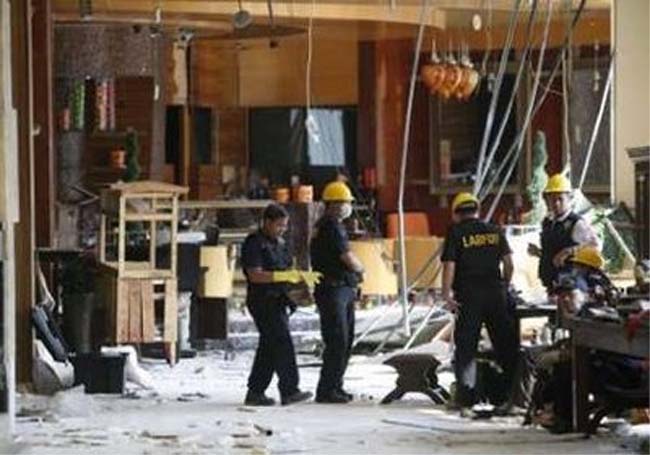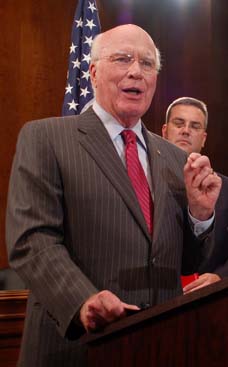
On learning that Jim had been in the Sailendra, I became frantic to find out if he were still alive. A mere 16 hours later, to my immense relief, he answered my e-mail. He was out of hospital, having sustained what he called "trivial injuries", including a temporary loss of hearing. Of the nearly 20 people at the roundtable meeting, however, four died and others were badly hurt. Jim's number two at CastleAsia lost part of a leg. But if last Friday's killers hoped to gain the sympathy of Indonesians this time around by attacking Jim and his expatriate colleagues and thereby lowering the proportion of domestic casualties, they failed. Of the 37 victims whose names and nationalities were known as of Monday, 60% were Indonesians, and that figure was almost certain to rise as more bodies were identified. The selective public acceptance of slaughter to which the targeting of infidel foreigners might have catered is, of course, grotesquely inhumane.
Donald K Emmerson writes: I have known RPCV Jim Castle since we were graduate students in Indonesia in the late 1960s
Contexts of terror in Indonesia
By Donald K Emmerson
Caption: Indonesian forensic investigators work at the site of the bombing at the Ritz-Carlton hotel in Jakarta July 18, 2009. Seven foreigners were among those killed in the bomb attacks on two luxury hotels in Indonesia's capital, the Jakarta Post newspaper reported on Saturday, citing a police official. Photo: REUTERS/Dita Alangkara/Pool
Jim Castle is a friend of mine. I have known him since we were graduate students in Indonesia in the late 1960s. While I labored in academe he went on to found and grow CastleAsia into what is arguably the most highly regarded private-sector consultancy for informing and interfacing expatriate and domestic investors and managers in Indonesia. Friday mornings he hosts a breakfast gathering of business executives at his favorite hotel, the JW Marriott in the Kuningan district of Jakarta.
Or he did, until the morning of July 17, 2009. On that Friday, shortly before 8am, a man pulling a suitcase on wheels strolled into the Marriott's Sailendra cafe, where Jim and his colleagues were meeting, and detonated the contents of his luggage. We know that the bomber was at least outwardly calm from the surveillance videotape of his relaxed walk across the lobby to the restaurant.
He wore a business suit, presumably to deflect attention, and before he blew himself up, he ordered a cup of coffee. Almost simultaneously, in the Airlangga restaurant at the Ritz Carlton hotel across the street, a confederate destroyed himself, killing or wounding a second set of victims. As of this writing, the toll stands at nine dead (including the killers) and more than 50 injured.
On learning that Jim had been in the Sailendra, I became frantic to find out if he were still alive. A mere 16 hours later, to my immense relief, he answered my e-mail. He was out of hospital, having sustained what he called "trivial injuries", including a temporary loss of hearing. Of the nearly 20 people at the roundtable meeting, however, four died and others were badly hurt. Jim's number two at CastleAsia lost part of a leg.
The same Sailendra cafe had been bombed before, in 2003. That explosion killed 12 people. Eight of them were Indonesian citizens, who also made up the great majority of the roughly 150 people wounded in that attack - and most of these Indonesian victims were Muslims. This distribution undercut the claim of the country's small jihadi fringe to be defending Islam's local adherents against foreign infidels.
But if last Friday's killers hoped to gain the sympathy of Indonesians this time around by attacking Jim and his expatriate colleagues and thereby lowering the proportion of domestic casualties, they failed. Of the 37 victims whose names and nationalities were known as of Monday, 60% were Indonesians, and that figure was almost certain to rise as more bodies were identified. The selective public acceptance of slaughter to which the targeting of infidel foreigners might have catered is, of course, grotesquely inhumane.
Since Susilo Bambang Yudhoyono was first elected president in 2004, Indonesia's real gross domestic product has averaged around 6% annual growth. In 2008 only four of East Asia's 19 economies achieved rates higher than Indonesia's 6.1% (Vietnam, Mongolia, China and Macau). In the first quarter of 2009, measured year-on-year, while the recession-hit economies of Malaysia, Singapore and Thailand all shrank, Indonesia's grew 4.4%. In the first half of 2009, the Jakarta Stock Exchange soared.
The economy is hardly all roses. Poverty and corruption remain pervasive. Unemployment and underemployment persist. The country's infrastructure badly needs repair. And the economy's performance in attracting foreign direct investment (FDI) has been sub-par: The US$2 billion in FDI that went to Indonesia in 2008 was less than a third of the $7 billion inflow enjoyed by Thailand's far smaller economy, notwithstanding Indonesia's far more stable politics.
Nevertheless, all things considered, the macro-economy in Yudhoyono's first term did reasonably well. We may never know whether the killer in the Sailendra cafe aimed to maximize economic harm. According to another expat consultant in Jakarta, Kevin O'Rourke, the day's victims included 10 of the top 50 business leaders in the city. "It could have been a coincidence," he said, or the bombers could have "known just what they were doing".
Imputing rationality to savagery is tricky business. But the attackers probably did hope to damage the Indonesian economy, notably foreign tourism and investment. In that context, the American provenance and patronage of the two hotels would have heightened their appeal as targets. Although the terrorists may not have known these details, the Ritz-Carlton Hotel Company is an independently operated division of Marriott International, Inc, which owns the JW Marriott brand, and both firms are headquartered on the outskirts of Washington DC.
Second-round revenge against the Marriott may also have played a role - assaulting a place that had rebuilt and recovered so quickly after being attacked in 2003. Spiteful retribution may have influenced the decision to re-attack the Kuta tourist area in Bali in 2005 after that neighborhood's recovery from the bomb carnage of 2002. Arguable, too, is the notion that 9/11 in 2001 was meant to finish the job started with the first bombing of the Twin Towers in 1993. And in all of these instances, the economy - Indonesian or American - suffered the consequences.
Panic buttons are not being pushed, however. Indonesian stock analyst Haryajid Ramelan's expectation seems plausible: that confidence in the economy will return if those who plotted the blasts are soon found and punished, and if investors can be convinced that these were "purely terrorist attacks" unrelated to domestic politics.
Sympathy for terrorism in Indonesia is far too sparse for Friday's explosions to destabilize the country. But they occurred merely nine days after Yudhoyono's landslide re-election as president on July 8, with three months still to go before the anticipated inauguration of his new administration on October 20. That timing ensured that some would speculate that the killers wanted to deprive the president of his second five-year term.
The president himself fed this speculation at his press conference on July 18, the day after the attacks. He brandished photographs of unnamed shooters with handguns using his picture for target practice. He reported the discovery of a plan to seize the headquarters of the election commission and thereby prevent his democratic victory from being announced. "There was a statement that there would be a revolution if SBY wins," he said, referring to himself by his initials.
"This is an intelligence report," he continued, "not rumors, nor gossip. Other statements said they wished to turn Indonesia into [a country like] Iran. And the last statement said that no matter what, SBY should not and would not be inaugurated." Barring information to the contrary, one may assume that these reports of threats were real, whether or not the threats themselves were. But why share them with the public?
Perhaps the president was defending his decision not to inspect the bomb damage in person - a gesture that would have shown sympathy for the victims while reassuring the population. He had wanted to go, he said, "But the chief of police and others suggested I should wait, since the area was not yet secure. And danger could come at any time, especially with all of the threats I have shown you. Physical threats."
Had Yudhoyono lost the election, or had he won it by only a thin and hotly contested margin, his remarks might have been read as an effort to garner sympathy and deflect attention from his unpopularity. The presidential candidates who lost to his landslide, Megawati Sukarnoputri and Jusuf Kalla, have indeed criticized how the July 8 polling was handled. And there were shortcomings. But even without them, Yudhoyono would still have won. In this context, speaking as he did from a position of personal popularity and political strength, the net effect of his comments was probably to encourage public support for stopping terrorism.
One may also note the calculated vagueness of his references to those - "they" - who wished him and the country harm. Not once in his speech did he refer to Jemaah Islamiyah, the network that is the culprit of choice for most analysts of the twin hotel attacks. Had he directly fingered that violently jihadi group, ambitious Islamist politicians such as Din Syamsuddin - head of Muhammadiyah, the country's second-largest Muslim organization - would have charged him with defaming Islam because Jemaah Islamiyah literally means "the Islamic group" or "the Islamic community".
One may hope that Din's ability to turn his Islamist supporters against jihadi terrorism and in favor of religious freedom and liberal democracy will someday catch up to his energy in policing language. Yet Yudhoyono was right not to mention Jemaah Islamiyah. Doing so would have complicated unnecessarily the president's relations with Muslim politicians whose support he may need when it comes to getting the legislature to turn his proposals into laws. Nor is it even clear that Jemaah Islamiyah is still an entity coherent enough to have, in fact, masterminded last Friday's attacks.
Peering into the future, one may reasonably conclude that the bombings' repercussions will neither annul Yudhoyono's landslide victory nor derail the inauguration of his next administration. Nor will they do more than temporary damage to the Indonesian economy. As for the personal aspect of what happened Friday, while mourning the dead, I am grateful that Jim and others, foreign and Indonesian, are still alive.
Donald K Emmerson heads the Southeast Asia Forum at Stanford University. He is a co-author of Islamism: Contested Perspectives on Political Islam (Stanford University Press, November 2009) and Hard Choices: Security, Democracy, and Regionalism in Southeast Asia (Stanford/ISEAS, 2008).













